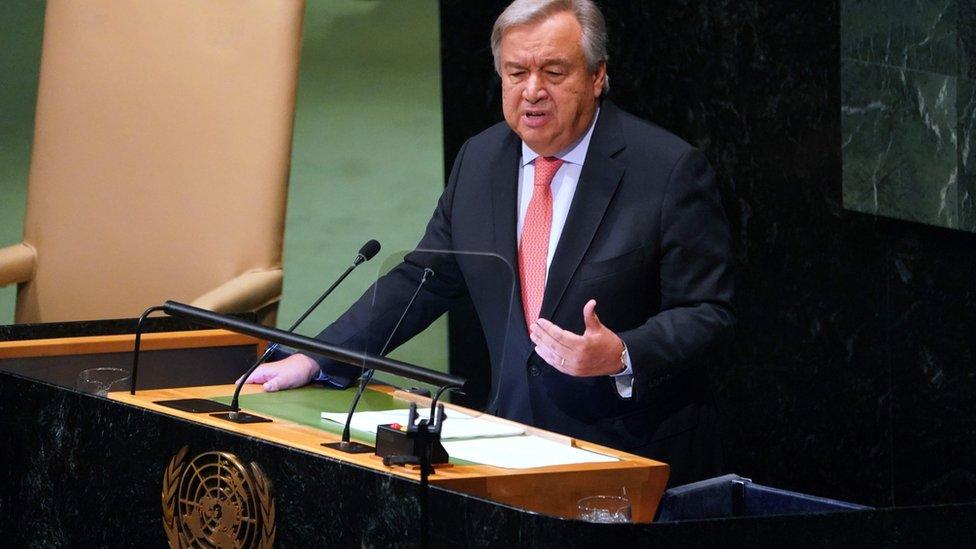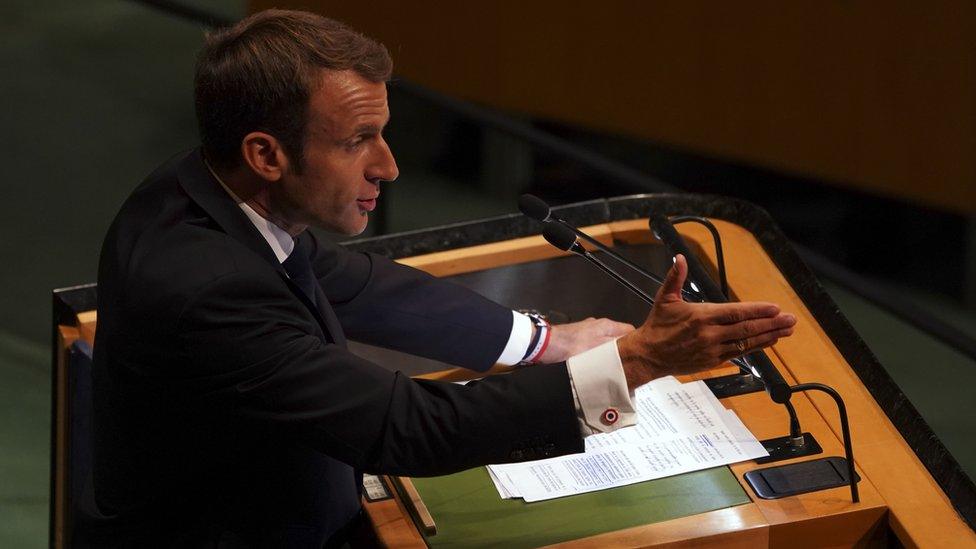Trump at UN: Iran 'sowing chaos, death, destruction'
- Published
"I wasn't expecting that reaction": Donald Trump addresses the UN general assembly
US President Donald Trump has attacked the Iranian leadership, accusing it of sowing "chaos, death and destruction" across the Middle East.
Addressing the United Nations General Assembly in New York, he defended his decision to abandon the nuclear deal.
Mr Trump also boasted that his administration had accomplished "more than almost any" other in US history.
His words were greeted with laughter, but he laughed back, saying: "Didn't expect that reaction."
Allow X content?
This article contains content provided by X. We ask for your permission before anything is loaded, as they may be using cookies and other technologies. You may want to read X’s cookie policy, external and privacy policy, external before accepting. To view this content choose ‘accept and continue’.
The United States was stronger, richer and safer, Mr Trump insisted.
He also defended his administration's nurturing of better ties with North Korea and its hard line on trade with China.
How much does America contribute to the UN's budget?
One of his key themes, however, was the right of America to pursue its own path in the world.
"I honour the right of every nation in this room to pursue its own customs, beliefs and traditions," he said.
"The United States will not tell you how to live or work or worship. We only ask that you honour our sovereignty in return."
By contrast, French President Emmanuel Macron argued passionately in favour of multilateralism.

A fresh assault on multilateralism
By James Robbins, BBC diplomatic correspondent
The immediate headline may be Donald Trump's replacement of North Korea by Iran as global enemy number one, but there was much more to his speech than that.

UN Secretary General Antonio Guterres warned against ignoring the lessons of 20th Century history
Last year's assault by the president on the United Nations and its multilateralism - the effort to bring groups of countries together to pursue a common goal - was vastly amplified this year.
It was amplified partly by Mr Trump's complete condemnation of globalism in general and of the International Criminal Court in particular, but also by his even stronger championing of individual national sovereignty, love of country and patriotism.
For Mr Trump that is the only path to freedom and securing the rights of America's people.
The UN secretary general provided a clear counter-narrative in his speech. Antonio Guterres was careful not to target President Trump by name but his message was transparent. He warned of a world walking the road of populism and isolationism once more, ignoring the lessons of 20th Century history - particularly in the 1930s - and risking a descent towards another global conflict.
After today's speeches the canyon which divides multilateralism's detractors and its defenders is more starkly visible, more blindingly lit, than ever before.

What exactly did Trump say about Iran?
"Iran's leaders sow chaos, death and destruction," he said.
US-Iran sanctions: What do they mean?
"They do not respect their neighbours or borders or the sovereign rights of nations. Instead, Iran's leaders plunder the nation's resources to enrich themselves and spread mayhem across the Middle East and far beyond."
Iranian President Hassan Rouhani responded by criticising the Trump administration for its hostility towards Iran while urging the US to return to negotiations.
Mr Rouhani said dialogue should begin by ending threats and what he called "unjust sanctions", adding that no nation could be brought to the negotiating table by force.
"The United States' understanding of international relations is authoritarian. In its estimation might makes right. Its understanding of power, not of legal and legitimate authority, is reflected in bullying and imposition," he said in New York.
In August, the US reinstated sanctions targeting the Iranian government's purchase of US dollars, Iran's trade in gold and other precious metals, and its automotive sector.
In November, a second batch of potentially more damaging sanctions will be reimposed on Iran's oil and shipping sectors as well as its central bank.
Mr Trump's national security adviser, John Bolton, warned Iran's leaders about the consequences of "crossing" the US.
"I might imagine they would take me seriously when I assure them today that if you cross us, our allies or our partners, if you harm our citizens, if you continue to lie, cheat and deceive, yes, there will indeed be Hell to pay," he told a conference in New York.
Iran has accused Mr Trump of waging "psychological warfare" against it. and denies any involvement in terrorism. It insists its nuclear programme is entirely peaceful.
Remaining members in the nuclear deal - the UK, China, France, Germany and Russia - say they will set up a new payment system to maintain business with Iran and bypass US sanctions.
The system would facilitate oil companies and businesses to continue trading without relying on the US-led global market and dollar, but exactly how the system would work is still being determined.
And North Korea?
The US leader said his meeting with North Korean leader Kim Jong-un in Singapore in June had led to developments unimaginable only a few months ago.
He said North Korean missiles and rockets had stopped flying in all directions, and North Korean nuclear testing had ceased.
"With support from many countries here today we have engaged with North Korea to replace the spectre of conflict with a bold and new push for peace," he said.
"I would like to thank Chairman Kim for his courage and for the steps he has taken, though much work remains to be done."
Sanctions, he said, would stay in place until North Korea's "denuclearisation occurs".
On Monday, Mr Trump said he expected a second summit with Mr Kim soon.
What other points did Trump make?
On world trade, he said his administration would not tolerate any further "abuses". He accused China of widespread product dumping and the theft of intellectual property, all of which, he argued, had led to a massive US trade deficit.
He accused the oil-producing cartel Opec of "ripping off" the world while many of its member countries relied on American military support.
He rejected the idea of globalism and praised the virtues of patriotism.
He said illegal immigration helped fund criminal networks while it made life difficult for local populations. Migration, he said, should not be governed by international bodies. At the same time, countries that migrants were leaving should be helped to build a better future for their people.
Mr Trump also praised India for raising millions of people out of poverty "and into the middle class", hailed Saudi Arabia's "bold, new" reforms, commended Israel as a "thriving democracy" and said Poland was a country that stood up for its own sovereignty.
What line did Macron take?
Speaking after Mr Trump, France's centrist president said that he would "never stop upholding the principle of sovereignty" but it should not be used as a weapon.

Mr Macron argued for multilateralism
"I will not leave the principle of sovereignty of peoples in the hands of nationalists who use it to attack the universality of our values," he said.
Arguing for dialogue, he said: "I do not believe in the law of the strongest... I believe in a third way which obliges us to push through a new model, a new global balance.
"We will not win in the 21st Century except with a strong multilateralism."